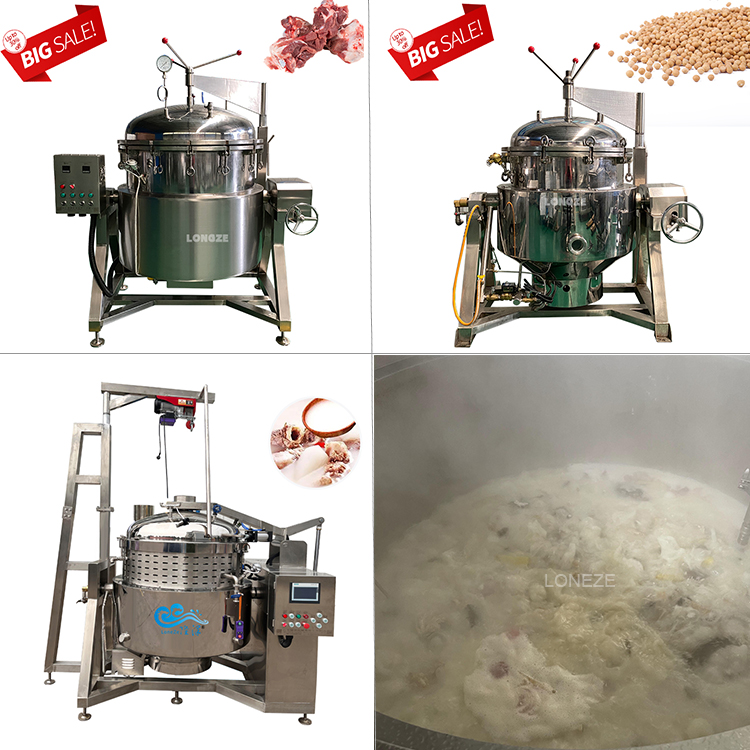Applications of Industrial Pressure Cookers
Writer:www.firemixer.com Time:2023-09-21 15:00 Browse:℃
As industrial processes advanced, so did the industrial pressure cooker. Modern industrial pressure cookers are engineered to withstand the rigorous demands of manufacturing environments. They are typically constructed from stainless steel, which offers exceptional durability and resistance to corrosion, ensuring a long operational life.
Key Features of Industrial Pressure Cookers
Pressure Regulation: Industrial pressure cookers are designed with precise pressure regulation mechanisms. This allows operators to control pressure levels with utmost accuracy, ensuring consistent results and product quality.
Safety Measures: Safety is paramount in industrial settings. These pressure cookers incorporate multiple safety features, such as pressure relief valves, safety interlocks, and advanced monitoring systems, to prevent accidents and protect operators.
Temperature Control: Temperature control is essential for various industrial processes. Industrial pressure cookers feature sophisticated temperature control systems, often with programmable options, ensuring precise cooking or sterilization.
Large Capacity: Unlike domestic pressure cookers, industrial models come in various sizes, some with enormous capacities to accommodate bulk production requirements.
Applications of Industrial Pressure Cookers
Food Processing: Food industries rely heavily on industrial pressure cookers for tasks like canning, sterilization, and cooking. The high-pressure environment efficiently destroys harmful microorganisms, extending shelf life while preserving flavor and nutritional value.
Pharmaceutical Manufacturing: In the pharmaceutical industry, precision and sterility are crucial. Pressure cookers are used for sterilizing equipment, preparing sterile media, and ensuring the safety of pharmaceutical products.
Chemical Processing: Industrial pressure cookers are used in chemical processes for reactions that require precise temperature and pressure control. They facilitate the production of various chemicals, including polymers and specialty chemicals.
Textile Industry: Dyeing and finishing processes in the textile industry benefit from industrial pressure cookers. These machines ensure uniform dye penetration and fixation, leading to consistent and vibrant colors.
Benefits of Industrial Pressure Cookers
Time Efficiency: Industrial pressure cookers significantly reduce processing time, leading to increased productivity and reduced energy consumption. This is especially critical in industries with high-volume production requirements.
Quality Assurance: The controlled environment of industrial pressure cookers guarantees consistent results, reducing the risk of product defects and ensuring product safety and quality.
Cost Savings: Energy-efficient and time-saving, industrial pressure cookers translate into lower operational costs over time, making them a wise investment for manufacturers.
Versatility: These machines can be adapted for various processes, offering versatility across industries. They can handle a wide range of materials and production needs.
Sustainability: Reduced cooking times and lower energy consumption contribute to a more sustainable manufacturing process, aligning with the growing emphasis on environmentally responsible practices.
The Industrial Pressure Cooker Revolution
The introduction of industrial pressure cookers to manufacturing processes has been nothing short of revolutionary. Let's delve into a few examples of how these machines have transformed various industries:
Food Processing: In the food industry, the ability to rapidly sterilize and cook large batches of products has led to increased production capacity and extended product shelf life. The technology has also made it possible to offer ready-to-eat and convenience foods to consumers.
Pharmaceuticals: The pharmaceutical industry's stringent requirements for sterility and precision make industrial pressure cookers indispensable. They have streamlined production processes, reduced contamination risks, and improved the overall safety of pharmaceutical products.
Chemical Manufacturing: Industrial pressure cookers have accelerated chemical reactions, allowing manufacturers to produce high-value chemicals efficiently. This has implications not only for cost savings but also for advancing research and development in the chemical sector.
Textiles: In the textile industry, pressure cookers have revolutionized dyeing and finishing processes, reducing water usage and ensuring consistent, high-quality results. This has significant implications for sustainability and product quality.
Conclusion
The industrial pressure cooker has come a long way from its domestic origins, evolving into a sophisticated and indispensable tool for various manufacturing industries. Its ability to save time, improve product quality, enhance safety, and reduce operational costs has propelled it to the forefront of modern industrial processes.
As industries continue to evolve and strive for greater efficiency and sustainability, the industrial pressure cooker is poised to play an even more significant role in shaping the future of manufacturing. With ongoing advancements in technology and materials, these machines are likely to become even more versatile and essential in addressing the challenges of tomorrow's industrial landscape.
